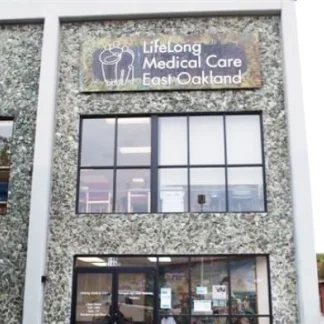Bi Bett Women's Recovery Center
Orchid Women’s Recovery Center, a Bi Bett Program, offers residential alcohol an...
LifeLong Medical Care – East Oakland Health Center provides dual-diagnosis alcohol and drug rehab and mental health treatment services for individuals in Oakland, California. They also provide valuable community resources, including referrals, medical services, housing, and employment assistance.
Treatment at LifeLong Medical Care begins with a mental health assessment to screen for symptoms of addiction or co-occurring mental health disorders.
The Intensive Outpatient Program (IOP) program is open to adults over 18. Clients attend individual and group treatment sessions for improved coping skills, peer support, therapy, and recovery meetings. The program also provides tobacco cessation, dental services, legal support, and housing resources. Sessions are typically held 3 to 4 days a week, between the hours of 8 am to 5 pm Monday through Friday.
Many major insurers, such as Medicare, United Healthcare, and other managed care plans are accepted. These insurers cover some or all of the costs of mental health and/or addiction recovery services when deemed medically necessary. Contact your provider to verify coverage because out-of-network benefits can vary.
Contact us for more information: (510) 981-4100

Connect with LifeLong Medical Care - East Oakland Health Center by calling their admissions team directly.
(510) 981-4100 Website Get DirectionsWhether a marriage or other committed relationship, an intimate partnership is one of the most important aspects of a person's life. Drug and alcohol addiction affects both members of a couple in deep and meaningful ways, as does rehab and recovery. Couples therapy and other couples-focused treatment programs are significant parts of exploring triggers of addiction, as well as learning how to build healthy patterns to support ongoing sobriety.
Research clearly demonstrates that recovery is far more successful and sustainable when loved ones like family members participate in rehab and substance abuse treatment. Genetic factors may be at play when it comes to drug and alcohol addiction, as well as mental health issues. Family dynamics often play a critical role in addiction triggers, and if properly educated, family members can be a strong source of support when it comes to rehabilitation.
Group therapy is any therapeutic work that happens in a group (not one-on-one). There are a number of different group therapy modalities, including support groups, experiential therapy, psycho-education, and more. Group therapy involves treatment as well as processing interaction between group members.
In individual therapy, a patient meets one-on-one with a trained psychologist or counselor. Therapy is a pivotal part of effective substance abuse treatment, as it often covers root causes of addiction, including challenges faced by the patient in their social, family, and work/school life.
Research clearly demonstrates that recovery is far more successful and sustainable when loved ones like family members participate in rehab and substance abuse treatment. Genetic factors may be at play when it comes to drug and alcohol addiction, as well as mental health issues. Family dynamics often play a critical role in addiction triggers, and if properly educated, family members can be a strong source of support when it comes to rehabilitation.
Group therapy is any therapeutic work that happens in a group (not one-on-one). There are a number of different group therapy modalities, including support groups, experiential therapy, psycho-education, and more. Group therapy involves treatment as well as processing interaction between group members.
In individual therapy, a patient meets one-on-one with a trained psychologist or counselor. Therapy is a pivotal part of effective substance abuse treatment, as it often covers root causes of addiction, including challenges faced by the patient in their social, family, and work/school life.
Group therapy is any therapeutic work that happens in a group (not one-on-one). There are a number of different group therapy modalities, including support groups, experiential therapy, psycho-education, and more. Group therapy involves treatment as well as processing interaction between group members.
In individual therapy, a patient meets one-on-one with a trained psychologist or counselor. Therapy is a pivotal part of effective substance abuse treatment, as it often covers root causes of addiction, including challenges faced by the patient in their social, family, and work/school life.
In individual therapy, a patient meets one-on-one with a trained psychologist or counselor. Therapy is a pivotal part of effective substance abuse treatment, as it often covers root causes of addiction, including challenges faced by the patient in their social, family, and work/school life.
Orchid Women’s Recovery Center, a Bi Bett Program, offers residential alcohol an...
Alameda Family Services is a drug and alcohol rehab and resource center in Alame...
Family Paths, located in Hayward, California, offers behavioral health care serv...